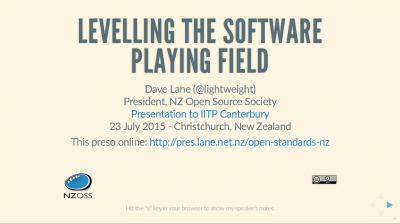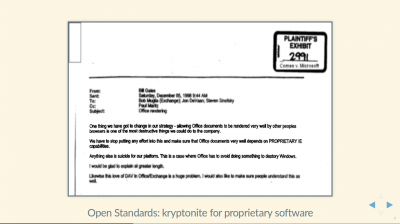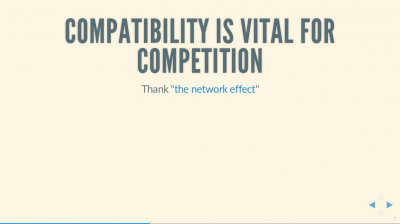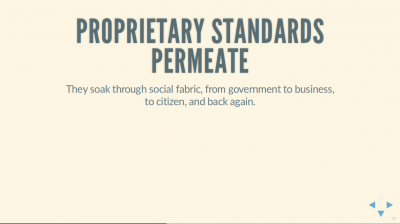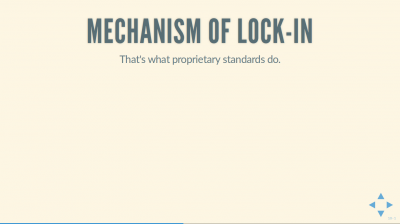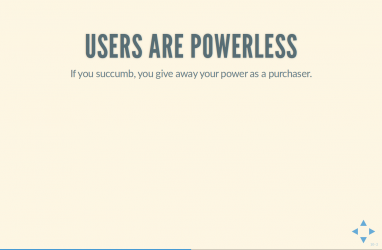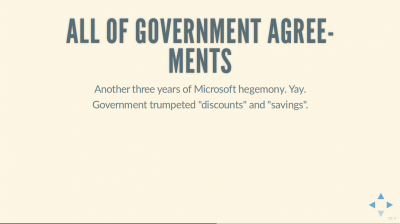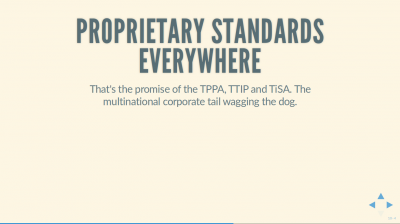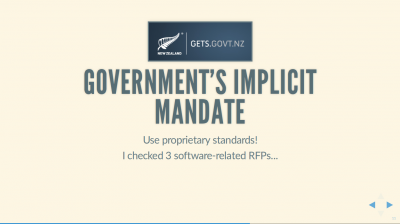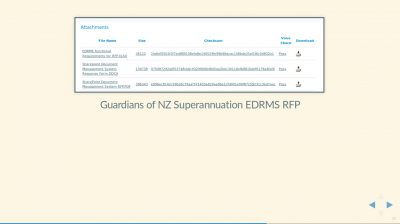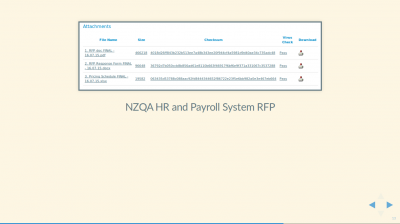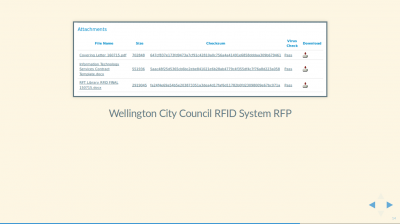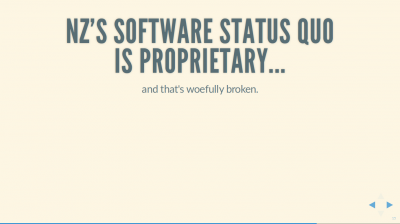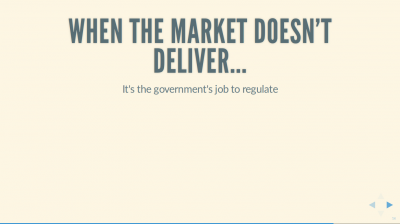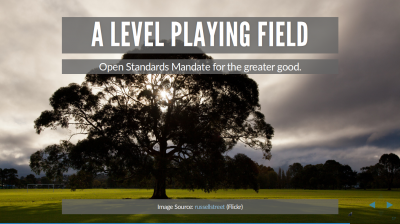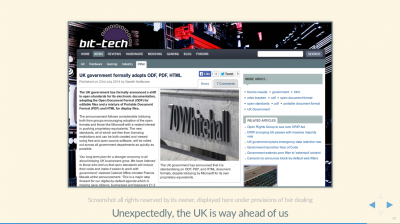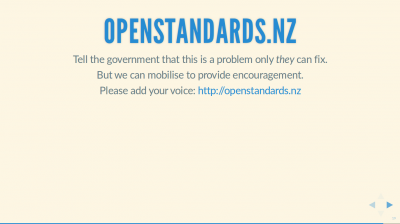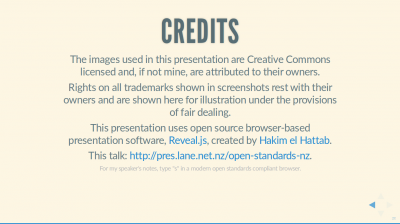This is an "unrolled" version of a talk created by Dave Lane and presented to the Institute of IT Professionals. He made the talk available as an online presentation under the Creative Commons Attribution license. We've taken the original slides and speaker notes and "remixed" them into a form that's better suited to being read on the web.
The purpose of this talk is to present an idea that I hope will resonate with many of you.
It involves asking some questions about something that is so common in most of our everyday lives that we take it entirely for granted...
How many of you have a drawer like this at home?
How many of you remember making phone purchasing decisions not based on which phone offered you the best value, but which phone best worked with your existing constellation of vastly overpriced chargers and accessories? Can you remember paying $50-$100 for specific chargers and adapters for your phone? Or not being able to charge them on holiday because you brought the wrong adapter by mistake? Running out of power points due to the plethora of different "wallwarts" you needed to service your array of devices which each had their own proprietary (or needlessly different) system?
Image Source: Lisa Padilla (Flickr)
How many of you have noticed that this isn't so much of a problem any more? (ok, everybody but the Apple users)... Did you ever wonder why this suddenly became ubiquitous a couple years ago? You can thank the European Union, thinking aloud. In 2014, they signalled they were considering imposing an open standard requirement on device (phone and tablet) chargers. Due to competition in the Android marketplace, OEMs switched to this with incredible speed trying to differentiate themselves from their competitors. Here's one of the two open standard charging cable connectors: a micro USB connector. The other is newer, more robust (and bi-directional) USB-C.
Of course, Apple (holding a complete monopoly over the iOS space) did not follow suit, meaning that Apple users missed out on this incredible efficiency impovement entirely.
Image Source: Pete (Flickr)
I can get one of these cables that will charge my newer phone from my computer for NZ$1.36 delivered to my door. The design of this plug is an open standard. Anyone can build cables and sockets that use this design without paying royalties or fearing patent infringement lawsuits. They don't even need permission.
Open Standard: Well defined technical specification available at no cost, typically online, created via a transparent process, multilateral (not controlled by a single entity), attracting no royalties, available without discrimination, and extensible via a well-defined process.
Standards compliance can typically be vetted by an independent third party (which might carry a cost).
Depending on who you ask, you'll get different definitions of open standards. I personally believe there are things that we can do as a society that improve the wellbeing and quality of life for everyone equally - for the "greater good". Things like building and maintaining public roads. Fire and ambulance service. I won't mention EQC to people in Chch (hah!). The public education and health systems. A "greater good" few people are conscious of is the open standards that surround us. All of these things have a cost to society in the form of taxes, but they actually create entirely new efficiences, markets, and opportunities and incentives for businesses to innovate.
Let's consider the measurement systems and market efficiency: has anyone ever considered the vast waste of resources caused by the US' (and to a lesser extent the UK's) obstinate refusal to let go of the US Standard system of measurement (similiar to Imperial units, but with some differences)? Think about how many of you have both metric and imperial spanners, socket sets, allen keys, and any number of other tools. Look at the fastern section at your local hardware store sometime. The waste through near duplication is staggering, and it's global. There's no functional justification for maintaining a separate system - it's just inertia and provincial hubris. My homeland is the source of more than a few facepalms.
We've got problems with competing standards - look at the hassles of different plug designs and the competition between 220V AC @ 50Hz and 110V AC @ 60Hz. Thankfully open standard AC/DC converters that can handle that range for most of our electronic devices these days.
Permissionless Innovation: because you never know where innovation will come from.
Open standards offer us something called "permissionless innovation". If you want to, you can manufacture a micro-USB powered device and sell it, without asking anyone's permission, as long as you comply with the standard. That's easy for independent organisations to measure. You can build your innovative new gadget around a micro-USB charging system without worrying that someone will sue you for patent infringement for doing so, or charge you royalties for using their standard, deny you the right to use the micro-USB standard if it suits their strategic interests to do so, or that the standard will change out from under you without a well controlled process that brings you along for the ride.
For technology, open standards commoditise the interface between technological layers. That means, for instance, that to create an innovative electronic product, you don't need to know how to design and build DC power systems, because well understood, tested, and supported specs are only an open standard away. In software, similar "coomoditised interfaces" exist at every level. They mean that not only can innovations be achieved with less specialised knowledge, lower investment and far less risk, but the results are more modular, tested, and, well, standardised!
I think these examples provide ample and undeniable evidence of the benefits and value agreed open standards bring to entire societies. They're like the "rising tide which lifts all boats". They're essentially the giant shoulders on which new generations of innovators can stand.
Image Source: Kristian Thy (Flickr)
Open Standards: kryptonite for proprietary software.
Sadly, however, if you want to compete with most of the major software products our government, and most businesses, schools, organisation, etc. use, the same is not true.
Remember my point about the different electrical system AC voltages and frequencies and plug designs in use in the world, and how much waste and inefficiency a few different standards causes? Well at least those are all open standards that have been adopted, for the most part, on a national level. Imagine if there were no standards... if every power generator picked whatever voltage and frequency and plug design suited them on the day? Imagine how hard it would be to build anything sort of product to work with such an unstable marketplace.
Although open standards are an inherent benefit to almost the entire market, their very existence erodes (from a technology corporation's point of view) the natural barriers to entry into the market for would-be competitors. It is therefore natural for corporations to view open standards as a competitive threat and to work against them.
Proprietary software is alergic to standards.
In the US lawsuit "Comes vs. Microsoft", an email from Bill Gates to his senior team was used in evidence. It demonstrated the incentives corporations like Microsoft is under and their motivation to deliberately undermine compatibility and open standards in order to protect their proprietary interests and market share... as Bill Gates somewhat over-dramatically said: "Anything else is suicide for our platform".
That's precisely the situation with the most commonly used software. Imagine that the digital artefacts produced by software we use today - particularly file formats, but also APIs, protocols - are arbitrary proprietary standards. Software suppliers will bang on about how open standards inpinge on their ability to "innovate" but make no mistake: they desperatedly want to dictate the format, and they want to use it to hobble would-be competitors, leverage the network effect and create a monopoly they can lock-in and exploit for as long as possible.
In most cases, if you want to compete with market leaders in various end-user software domains - all multinational corporations like Microsoft, Adobe, Apple, Oracle, SAP, ESRI, and others, then you either have to somehow offer a product that is compatible with their proprietary format standards. If you are another huge corporation, you might be able to buy permission to do that, maybe... or invest huge amounts of energy trying to reverse engineer their proprietary standards. And if, against all odds, you succeed, all they need to do is issue an update that subtly changes that proprietary standard, completely breaking your compatibility.
The government requires us to communicate with it in order to do business with it. And they use these proprietary formats [GETS images] - by requiring us to use these templates, for example, the government implicitly mandatings that private industry use Microsoft Office. That's quite simply anti-competitive.
Ultimately, proprietary standards are a mechanism for achieving "lock-in". Consider this email, used in evidence in a class action suit against Microsoft back in 2006 [BGatesEmailReProprietaryStds.png] Companies like Microsoft knew their monopoly profits absolutely depended on maintaining proprietary control of formats in 1996, and no doubt well before that. And of course, the goal of every corporation is to achieve a market monopoly it can exploit to maximise its profits. Corporate suppliers of proprietary software will never voluntarily adopt open standards. They'll only do it under extreme circumstances... the same sort that caused all the phone manufacturers to adopt micro-USB: government regulation.
Users are powerless: If you succumb, you give away your power as a purchaser.
The biggest problem we face at the moment is that our government doesn't realise it's over a barrel. We have our ministers crowing about how they've achieved another all-of-government licensing agreement with the Microsoft Corporation... that'll save them heaps. Compared to what? Compared to what Microsoft originally told them they'd pay. Not against a competing offering. Because there is no competing offering that is compatible with MS Office's proprietary formats. So what choice to do they have. Regardless of the "deal" they got and the utterly fictitious savings, make no mistake - we, the taxpayer are paying extortionate monopoly rents to help the government preserve the monoculture they bought into and foolishly renew every few years.
All of Government Agreements: Another three years of Microsoft hegemony. Yay. Government trumpeted 'discounts' and 'savings'.
The government is negotiating from a position of zero leverage because they are failing to exercise their sovereign right to regulate a fundamentally broken market. In mature business domain, there are open standards and regulation. The exist for software, but the mega-vendors pretend they don't. And so governments ignore them in the software industry.
With their unprecedented political influence in the US, software corporations have shaped the policy landscape to suit their ends. The Trans-Pacific Partnership Agreement and the Trade in Services Agreement are two ways they are using the US government to try to propagate those policy frameworks across the world - the TTIP is the equivalent agreement trying to deal with the Atlantic. All are top secret.
I checked 3 software-related RFPs on the NZ government's official "Government Electronic Tendering System"or "GETS" website, through which all open tenders are announced to see to what degree they used open or proprietary file formats...
3 of 3 included one file in an open standard format (PDF) but crucial (see next 3 slides) accompanying documentation and response templates (which you typically must use or face your tender response being down rated) assume that you are using proprietary Micrsoft software, and implicitly discouraging the use of any other technology, including those which support open standards by default.
Guardians of NZ Superannuation EDRMS RFP
Note that the description of the RFP (read-only) is in the open standard PDF format. The response template and functional requirements, however, are in Microsoft proprietary formats, XLSX and DOCX. 1 for 1 for implicitly mandating respondents to use Microsoft Office to reliably read and edit the proprietary formats.
Similarly the NZQA HR and Payroll System RFP tender has an open PDF description but proprietary DOCX template and XLSX pricing schedule. 2 for 2.
Wellington City Council RFID System RFP tender showing the same pattern: PDF, DOCX, and XLSX
3 out of 3 tenders implicitly mandate the use of proprietary Microsoft software to meet government tendering requirements. That is anti-competitive.
When the market doesn't deliver... It's the government's job to regulate.
We, the NZ software industry, need to tell our government to do one of its fundamental duties: to impose regulation for the greater good when the market can't or won't regulate itself.
We don't want to mandate open source software. That would be counter productive. All we want is a level playing field for software, based on mandated compliance with open standards, as you would expect in just about every other marketplace. Open source software will succeed on its own merits, just as it has on the web - which is perhaps the aspect of the digital world most dominated by open standards - the mobile world, the cloud, the supercomputer, and in the emerging Internet of Things.
Image Source: russellstreet (Flickr)
Unexpectedly, the UK is way ahead of us.
Screenshot all rights reserved by its owner, displayed here under provisions of fair dealing
But we can mobilise to provide encouragement.
Please add your voice to http://openstandards.nz
The NZOSS has started this campaign to end the period of government supported monopolistic exploitation we're currently in. We want the NZ government to show some backbone and stop digging a deeper hole not only for itself, but for all the people of NZ.
The images used in this presentation are Creative Commons licensed and, if not mine, are attributed to their owners.
Rights on all trademarks shown in screenshots rest with their owners and are shown here for illustration under the provisions of fair dealing.
This presentation uses open source browser-based presentation software, Reveal.js, created by Hakim el Hattab.
This talk: http://pres.lane.net.nz/open-standards-nz.
